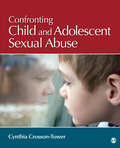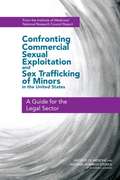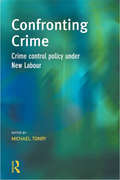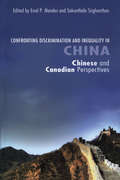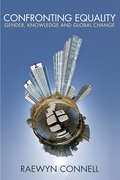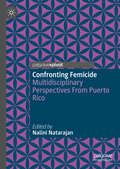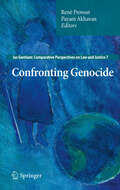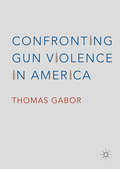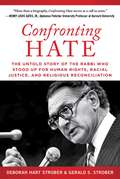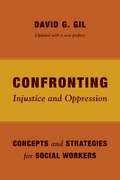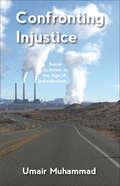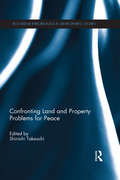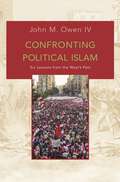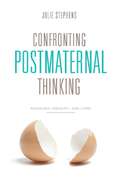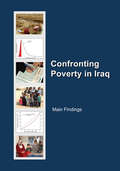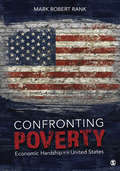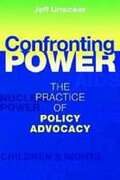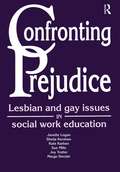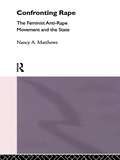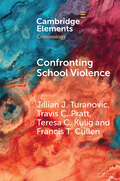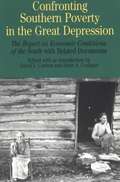- Table View
- List View
Confronting Child and Adolescent Sexual Abuse
by Cynthia D. Crosson-TowerConfronting Child and Adolescent Sexual Abuse is the first text to examine the history, theory, treatment, and prevention of this complex phenomenon. With in-depth insights into the psychologies of victims, their families, and the perpetrators, this comprehensive text shows readers how to recognize the symptoms and impact of childhood sexual abuse, critically engage with the unique nature of each case, complete a thorough assessment, develop a treatment plan, and effectively intervene in critical situations. A national expert on child abuse and neglect and the author of numerous books and publications, Cynthia Crosson-Tower addresses a wide range of special topics and helps readers prepare for working in this challenging professional field.
Confronting Child and Adolescent Sexual Abuse
by Cynthia D. Crosson-TowerConfronting Child and Adolescent Sexual Abuse is the first text to examine the history, theory, treatment, and prevention of this complex phenomenon. With in-depth insights into the psychologies of victims, their families, and the perpetrators, this comprehensive text shows readers how to recognize the symptoms and impact of childhood sexual abuse, critically engage with the unique nature of each case, complete a thorough assessment, develop a treatment plan, and effectively intervene in critical situations. A national expert on child abuse and neglect and the author of numerous books and publications, Cynthia Crosson-Tower addresses a wide range of special topics and helps readers prepare for working in this challenging professional field.
Confronting Commercial Sexual Exploitation and Sex Trafficking of Minors in the United States: A Guide for the Legal Sector
by Institute of MedicineEvery day in the United States, children and adolescents are victims of commercial sexual exploitation and sex trafficking. These are not only illegal activities, but also forms of violence and abuse that result in immediate and long-term physical, mental, and emotional harm to victims and survivors. In 2013, the Institute of Medicine/National Research Council released the report Confronting Commercial Sexual Exploitation and Sex Trafficking of Minors in the United States. The report found that the United States is in the very early stages of recognizing, understanding, and developing solutions for these crimes. Law enforcement professionals, attorneys, and judges all have important roles to play in responding to commercial sexual exploitation and sex trafficking of minors in the United States. Their knowledge and ability to identify victims, investigate cases, and make appropriate referrals is crucial to the development of an overall response to these crimes. This Guide for the Legal Sector provides a summary of information from the original report that is most relevant to individuals within the legal sector who interact in some way with victims, survivors, and perpetrators of commercial sexual exploitation and sex trafficking of minors. This includes federal, state, county, local, and tribal law enforcement agencies; police officers and investigators; probation officers; parole officers; corrections officers; prosecutors and defense attorneys; victim advocates; and judges. This guide includes definitions of key terms and an overview of risk factors and consequences; noteworthy examples of efforts by law enforcement personnel, attorneys, the juvenile and criminal justice systems, and the judiciary; multisector and interagency efforts in which the legal sector plays an important role; and recommendations aimed at identifying, preventing, and responding to these crimes.
Confronting Crime: Crime control policy under new labour (Cambridge Criminal Justice Series)
by Michael TonryFrom Labour's promise to be 'tough on crime, tough on the causes of crime' through to the White Paper and new criminal justice legislation, controlling crime and reforming the criminal justice system has been one of the government's key priorities.This book provides a detailed review of the thinking behind these new plans and legislation, looking at policies and proposals in the field of punishment, particularly those embodied in the Halliday Review of the Sentencing Framework (2001), the government White Paper Justice for All (2002), and the 2002 Criminal Justice Bill. The contributors to the book subject to scrutiny the evidence for the 'evidence-based policy making' that is often claimed as a distinctive new feature to these processes, examining approaches to drug-dependent offenders, dangerous sex offenders, nuisance offenders, procedural and evidential protections in the courts, sentencing guidelines, sentencing management, racism in sentencing, custody plus, custody minus, and reducing the prison population.
Confronting Discrimination and Inequality in China: Chinese and Canadian Perspectives
by Errol P. Mendes Sakunthala SrighanthanConfronting Discrimination and Inequality in China focuses on the most challenging areas of discrimination and inequality in China, including discrimination faced by HIV/AIDS afflicted individuals, rural populations, migrant workers, women, people with disabilities, and ethnic minorities. The Canadian contributors offer rich regional, national, and international perspectives on how constitutions, laws, policies, and practices, both in Canada and in other parts of the world, battle discrimination and the conflicts that rise out of it. The Chinese contributors include some of the most independent-minded scholars and practitioners in China. Their assessments of the challenges facing China in the areas of discrimination and inequality not only attest to their personal courage and intellectual freedom but also add an important perspective on this emerging superpower.
Confronting Equality: Gender, knowledge and global change
by Raewyn ConnellWhat does social equality mean now, in a world of markets, global power and new forms of knowledge?In Confronting Equality Raewyn Connell combines vivid research with theoretical insight and radical politics to address this question. The focus moves across family change, class and education, intellectual workers, and the global dimension of social science, to contemporary theorists of knowledge and global power, and the political dilemmas of today's left. Written with clarity and passion, the book proposes a bold agenda for social science, and shows it in action.Raewyn Connell is known internationally for her powerfully argued and field-defining books Masculinities, Gender and Power, Making the Difference, and Southern Theory. This new volume gathers together a broad spectrum of her recent work which distinctively combines close-focus field research and large-scale theory. It brings this to bear on those questions of social justice and struggles for change that have long been at the heart of her writing, and will have wide-ranging implications for the social sciences and social activism in the twenty-first century.'[This is] social science at its best: characterised by richly theorised empirical research, and carving out a place for a radically generative and engaged world sociology.' - Professor Michael A. Messner, University of Southern California
Confronting Femicide: Multidisciplinary Perspectives From Puerto Rico
by Nalini NatarajanThis book explores the idea that the extreme criminal action that constitutes femicide must be explored not in isolation, but in the context of gender cruelty and misogyny in society. It focuses on the island of Puerto Rico as a case study. The chapters cover topics such as Afro-feminist and anti-racist grassroots work, transfeminist justice, and the role of art in resistance. This volume is essential reading for scholars of gender studies, activists fighting against gender-based violence, and anyone interested in understanding the complex layers of oppression that lead to such extreme manifestations of violence. It invites readers to think through critical questions about justice, resistance, and the power of community organizing.
Confronting Genocide (Ius Gentium: Comparative Perspectives on Law and Justice #7)
by Payam Akhavan René Provost"Never again" stands as one the central pledges of the international community following the end of the Second World War, upon full realization of the massive scale of the Nazi extermination programme. Genocide stands as an intolerable assault on a sense of common humanity embodied in the Universal Declaration of Human Rights and other fundamental international instruments, including the Convention on the Prevention and Punishment of the Crime of Genocide and the United Nations Charter. And yet, since the Second World War, the international community has proven incapable of effectively preventing the occurrence of more genocides in places like Cambodia, Yugoslavia, Rwanda and Sudan. Is genocide actually preventable, or is "ever again" a more accurate catchphrase to capture the reality of this phenomenon? The essays in this volume explore the complex nature of genocide and the relative promise of various avenues identified by the international community to attempt to put a definitive end to its occurrence. Essays focus on a conceptualization of genocide as a social and political phenomenon, on the identification of key actors (Governments, international institutions, the media, civil society, individuals), and on an exploration of the relative promise of different means to prevent genocide (criminal accountability, civil disobedience, shaming, intervention).
Confronting Gun Violence in America
by Thomas GaborThis book critically examines the link between guns and violence. It weighs the value of guns for self-protection against the adverse effects of gun ownership and carrying. It also analyses the role of public opinion, the Second Amendment to the US Constitution, and the firearms industry and lobby in impeding efforts to prevent gun violence. Confronting Gun Violence in America explores solutions to the gun violence problem in America, a country where 90 people die from gunshot wounds every day. The wide-range of solutions assessed include: a national gun licensing system; universal background checks; a ban on military-style weapons; better regulatory oversight of the gun industry; the use of technologies, such as the personalization of weapons; child access prevention; repealing laws that encourage violence; changing violent norms; preventing retaliatory violence; and strategies to rebuild American communities. This accessible and incisive book will be of great interest to students and researchers in criminology and sociology, as well as practitioners and policy-makers with an interest in gun ownership and violence.
Confronting Hate: The Untold Story of the Rabbi Who Stood Up for Human Rights, Racial Justice, and Religious Reconciliation
by Deborah Hart Strober Gerald S. StroberIn this biography, Gerald and Deborah Strober draw from original source materials and numerous interviews to detail the life and career of the esteemed Rabbi Marc Tanenbaum, a seminal 20th century figure in interfaith relations in the US and around the world. From his position as Director of Interreligious Affairs at the American Jewish Committee, Rabbi Tanenbaum was deeply involved in the historic Vatican II Council, which promulgated a landmark encyclical on Catholic-Jewish relations. Rabbi Tanenbaum also was one of the few Jewish leaders who worked closely with Reverend Billy Graham and other evangelicals. He worked tirelessly as a civil rights activist and was active in the cause of Soviet Jewry, as well.Confronting Hate details this esteemed career and his interactions with the likes of television legends Norman Lear, Don Hewitt, and Franco Zeffirelli; Jesse Jackson; Martin Luther King, Jr.; and several US presidents, from Dwight D. Eisenhower to George H.W. Bush. This book leaves no stone unturned in covering the public and private aspects of the life of “the human rights rabbi.” The authors bring to light the immense international influence that Rabbi Tanenbaum has even today, more than twenty-five years after his passing.
Confronting Injustice and Oppression: Concepts and Strategies for Social Workers
by David G. GilGil's guiding text gives social workers the knowledge and confidence they need to change unjust realities.
Confronting Injustice and Oppression: Concepts and Strategies for Social Workers (Foundations of Social Work Knowledge Series)
by David GilMore urgent than ever, David G. Gil's guiding text gives social workers the knowledge and confidence they need to change unjust realities. Clarifying the meaning, sources, and dynamics of injustice, exploitation, and oppression and certifying the place of the social worker in combating these conditions, Gil promotes social-change strategies rooted in the nonviolent philosophies of Mahatma Gandhi and Martin Luther King Jr.. He shares suggestions for transition policies intended to alleviate poverty, unemployment, and discrimination and examines modes of radical social work practice compatible with the UN Universal Declaration of Human Rights and President Roosevelt's proposed "Economic Bill of Rights." For this updated edition, Gil considers the factors driving two crucial developments since his volume's initial publication: the Middle East's Arab Spring and the U.S. Occupy Wall Street movement.
Confronting Injustice: Social Activism in the Age of Individualism
by Umair Muhammad“Written by an activist for activists . . . a powerful call for collective action against the social causes of poverty and climate change.” —Climate & CapitalismA new generation of activists working for economic and environmental justice, and against war and poverty, confronts critical questions. Why is the world so unjust and crisis-prone? What kind of world should we fight for? How can we win? In this panoramic yet accessible book, Umair Muhammad engages with these and other urgent debates. He argues that individual solutions like “buying green” are dead ends and that hope for the future lies in a radical expansion of democracy and the transformation of the economy from one based on profit to one that can meet human needs.“A highly recommended read for those who are interested in working together to transform society.” —Chelsey Rhodes, founder of DelusionsofDevelopment.com“This book will force activists to check their intentions. I wasn’t even halfway done before I wanted to share it with everyone I knew.” —Maryama Ahmed, Toronto-based community organizer“A wide-ranging and unflinching look at the global nature of the challenges contemporary activists seek to address. Its blend of environmental and anti-imperialist analysis, grounded in direct organizing experience, makes this a powerful and important resource.” —Dru Oja Jay, coauthor of Paved with Good Intentions“What [Umair] provides is an opening statement in an important discussion that activists must have . . . A must-read book for today’s activists.” —Ian Angus, author of A Redder Shade of Green
Confronting Land and Property Problems for Peace (Routledge Explorations in Development Studies)
by Shinichi TakeuchiThis collection clarifies the background of land and property problems in conflict-affected settings, and explores appropriate policy measures for peace-building. While land and property problems exist in any society, they can be particularly exacerbated in conflict-affected settings – characterized by unstable security, weak governance, loss of proper documentation as well as the return of refugees and Internally Displaced Persons. Unless these problems are properly addressed, they can destabilize fragile political order and hinder economic recovery. Although tackling land and property problems is an important challenge for peace-building, it has been relatively neglected in recent debates about liberal peace-building as a result of the strong focus on state-level institution building, such as security sector reforms and transitional justice. Using rich original data from eight conflict-affected countries, this book examines the topic from the viewpoint of State-society relationship. In contrast to previous literature, this volume analyses land and property problems in conflict-afflicted areas from a long-term perspective of state-building and economic development, rather than concentrating only on the immediate aftermath of the conflict. The long-term perspective enables not only an understanding of the root causes of the property problems in conflict-affected countries, but also elaboration of effective policy measures for peace. Contributors are area specialists and the eight case study countries have been carefully selected for comparative study. The collection applies a common framework to a diverse group of countries – South Sudan, Uganda, Rwanda, Burundi, Cambodia, Timor-Leste, Colombia, and Bosnia-Herzegovina.
Confronting Political Islam: Six Lessons from the West's Past
by John M. OwenHow the conflicts of Western history shed light on current upheavals in the Middle EastPolitical Islam has often been compared to ideological movements of the past such as fascism or Christian theocracy. But are such analogies valid? How should the Western world today respond to the challenges of political Islam? Taking an original approach to answer this question, Confronting Political Islam compares Islamism's struggle with secularism to other prolonged ideological clashes in Western history. By examining the past conflicts that have torn Europe and the Americas—and how they have been supported by underground networks, fomented radicalism and revolution, and triggered foreign interventions and international conflicts—John Owen draws six major lessons to demonstrate that much of what we think about political Islam is wrong.Owen focuses on the origins and dynamics of twentieth-century struggles among Communism, Fascism, and liberal democracy; the late eighteenth- and nineteenth-century contests between monarchism and republicanism; and the sixteenth- and seventeenth-century wars of religion between Catholics, Lutherans, Calvinists, and others. Owen then applies principles learned from the successes and mistakes of governments during these conflicts to the contemporary debates embroiling the Middle East. He concludes that ideological struggles last longer than most people presume; ideologies are not monolithic; foreign interventions are the norm; a state may be both rational and ideological; an ideology wins when states that exemplify it outperform other states across a range of measures; and the ideology that wins may be a surprise.Looking at the history of the Western world itself and the fraught questions over how societies should be ordered, Confronting Political Islam upends some of the conventional wisdom about the current upheavals in the Muslim world.
Confronting Postmaternal Thinking: Feminism, Memory, and Care
by Julie StephensThere is a deep cultural anxiety around public expressions of maternalism and the application of maternal values to society as a whole. Julie Stephens advances a notion of postmaternal thinking to signal this growing unease with maternal forms of subjectivity and maternalist perspectives. In moving beyond policy definitions, which emphasize the priority given to women's claims as employees over their political claims as mothers, Stephens details an elaborate process of cultural forgetting that has accompanied this repudiation of the maternal.Reclaiming an alternative feminist position through an investigation of oral history, life narratives, Web blogs, and other rich and varied sources, Stephens confronts the core claims of postmaternal thought and challenges dominant representations of feminism as having forgotten motherhood. Deploying the interpretive framework of memory studies, she examines the political structures of forgetting surrounding the maternal and the weakening of nurture and care in the public domain. She views the promotion of an illusory, self-sufficient individualism as a form of social unmothering that is profoundly connected to this ethos. In rejecting both traditional maternalism and the new postmaternalism, Stephens challenges prevailing paradigms and makes way for an alternative feminist maternalism centering on a politics of care.
Confronting Postmaternal Thinking: Feminism, Memory, and Care
by Julie StephensThere is a deep cultural anxiety around public expressions of maternalism and the application of maternal values to society as a whole. Julie Stephens examines why postmaternal thinking has become so influential in recent decades and why there has been a growing unease with maternal forms of subjectivity and maternalist perspectives. In moving beyond policy definitions, which emphasize the priority given to women's claims as employees over their political claims as mothers, Stephens details an elaborate process of cultural forgetting that has accompanied this repudiation of the maternal.Reclaiming an alternative feminist position through an investigation of oral history, life narratives, Web blogs, and other rich and varied sources, Stephens confronts the core claims of postmaternal thought and challenges dominant representations of feminism as having forgotten motherhood. Deploying the interpretive framework of memory studies, she examines the political structures of forgetting surrounding the maternal and the weakening of nurture and care in the public domain. She views the promotion of an illusory, self-sufficient individualism as a form of social unmothering that is profoundly connected to this ethos. In rejecting both traditional maternalism and the new postmaternalism, Stephens challenges prevailing paradigms and makes way for an alternative feminist maternalism centering on a politics of care.
Confronting Poverty in Iraq: Main Findings
by World BankThis report provides the most comprehensive and rigorous analysis of Iraqi income and expenditure in several decades. The report makes extensive use of the Iraq Household Socio-Economic Survey, the first nationwide income and expenditure survey since 1988. IHSES data is complemented income and expenditure data from a wide range of other measures of living standards, allowing us to analyze living standards in a holistic way. The analysis presented here was performed with two main goals-first, to inform the Government's Poverty Reduction Strategy; and second, to serve as a baseline for future assessments of changes in living standards and the identification of critical issues for deeper examination. Iraqi living standards have two unusual characteristics. First, they have fallen over the past generation. Second, they feature surprisingly little inequality. These characteristics are both rooted in Iraq's recent history of authoritarian government, war, military occupation, insurgency, and civil strife leading to infrastructure destruction and population displacement. There have been few opportunities for individuals to prosper from professional or entrepreneurial activities. Decades of neglected investment have resulted in deterioration of social services and economic infrastructure. Consequently, individuals have lacked capabilities to prosper and an investment climate conducive to prosperity. School enrollment and life expectancy have declined. Extremely low returns to education reflect the combination of poor educational quality and lack of employment opportunities. In terms of economic infrastructure, access to reliable electricity and water, and even access to paved roads are low, are further reflections of decades of neglect. While the upper end of the distribution has been pulled down by a lack of opportunities, the lower end has been supported by direct government provision of food. The Public Distribution System (PDS) provides 85 percent of food needs. While PDS has been useful as a safety net for the poor and the vulnerable, the system is expensive, inefficient, and fiscally risky. Indeed, PDS food rations account for a far greater share of public spending than does education or health. Going forward, Iraq faces two main challenges. First, although Iraq does not have to develop from scratch, it faces a formidable challenge in re-development. Second, a shift by the Government is required-from direct provision of basic subsistence toward investment in human capacities. The Government can provide an enabling environment through investments in economic infrastructure and services to business and citizens, thus allowing the population to make productive use of education and their own labor. Both challenges are now being taken up by the Poverty Reduction Strategy, which articulates a detailed set of required actions and outlines priorities for government spending.
Confronting Poverty: Economic Hardship in the United States
by Mark Robert RankConfronting Poverty is a text that introduces students to the dynamics of poverty and economic hardship in the U.S. It address four fundamental question: 1) What is the nature, prevalence, and characteristics of poverty; 2) Why does poverty exist; 3) What are the effects and consequences of poverty upon individuals and the wider society; and 4) How can poverty be reduced and alleviated? In clear and engaging writing, Confronting Poverty provides students with the most up-to-date research and thinking regarding American poverty and inequality. It includes the many insights of the author’s 30 years of writing and teaching on the subject. It is designed to be used as either a primary or secondary text in a wide range of courses across academic disciplines. In addition, Confronting Poverty makes use of an innovative companion website developed by the author. The focal point of the website is an interactive tool, called the Poverty Risk Calculator, that has been constructed with hundreds of thousands of case records extracted from the Panel Study of Income Dynamics (PSID) data set. The website also includes a discussion guide on various aspects of poverty along with many other interactive links and activities (short documentary films, video interviews and lectures, interactive data sources, research briefs, magazine and newspaper articles). Each chapter includes an on-line activity from the companion website for students to engage in, resulting in a dynamic learning experience.
Confronting Poverty: Economic Hardship in the United States
by Mark Robert RankConfronting Poverty is a text that introduces students to the dynamics of poverty and economic hardship in the U.S. It address four fundamental question: 1) What is the nature, prevalence, and characteristics of poverty; 2) Why does poverty exist; 3) What are the effects and consequences of poverty upon individuals and the wider society; and 4) How can poverty be reduced and alleviated? In clear and engaging writing, Confronting Poverty provides students with the most up-to-date research and thinking regarding American poverty and inequality. It includes the many insights of the author’s 30 years of writing and teaching on the subject. It is designed to be used as either a primary or secondary text in a wide range of courses across academic disciplines. In addition, Confronting Poverty makes use of an innovative companion website developed by the author. The focal point of the website is an interactive tool, called the Poverty Risk Calculator, that has been constructed with hundreds of thousands of case records extracted from the Panel Study of Income Dynamics (PSID) data set. The website also includes a discussion guide on various aspects of poverty along with many other interactive links and activities (short documentary films, video interviews and lectures, interactive data sources, research briefs, magazine and newspaper articles). Each chapter includes an on-line activity from the companion website for students to engage in, resulting in a dynamic learning experience.
Confronting Power: The Practice of Policy Advocacy
by Jeff UnsickerConfronting Power provides an academically rigorous, yet practical and comprehensive framework and sets of concepts for planning, implementing and evaluating policy advocacy. Based on the author's experiences both as teacher and activist, the framework is general enough to be relevant for advocacy in a variety of sectors such as poverty alleviation, human rights and the environment, in different national and cultural contexts, and at levels ranging from influencing a town council to transnational institutions such as the World Bank. The book grounds the concepts via a series of case studies, which themselves illustrate a range of different advocacy campaigns in both the Global South and the United States. Designed to be both a textbook and a guide for practical action, Confronting Power should become an essential component of every teacher and social advocate's tool kit.
Confronting Prejudice: Lesbian and Gay Issues in Social Work Education
by Joy Trotter Kate Karban Janette Logan Sue Mills Sheila Kershaw Margo SinclairThis book brings lesbian and gay issues to the centre of the debate on anti-oppressive practice. It is an accessible and practical guide to the subject for all involved in student learning, aiming to provide practice teachers and educators with tools to help students develop their understanding of the effects of heterosexism as well as providing strategies for positive practice. Part 1 considers: ¢ the social background, raising important issues about the ways in which lesbians and gay men are marginalised in society and the subsequent reflection in social work education and practice; ¢ the legal framework within which social workers and probation officers operate, drawing attention to some of the tensions and dilemmas facing practitioners attempting to develop anti-discriminatory and anti-oppressive practice; ¢ a framework within which to develop non-homophobic and non-heterosexist practice within the Diploma in Social Work, raising important issues which need to be addressed both within the academic institutions and the practice learning environment; ¢ how to facilitate students’ learning in relation to anti-discriminatory and anti-oppressive practice with lesbian and gay service users; ¢ the assessment of students’ competence within the academic and practice curriculum; ¢ a model of good practice in working with lesbians and gay men, offering practical suggestions which can be incorporated into existing policies and procedures. Part 2 provides practical teaching and training materials including how to organise the training session, exercises and notes for trainers. these can be adapted to reflect individual or group needs, within the practice learning or academic environment.
Confronting Rape: The Feminist Anti-Rape Movement and the State (International Library of Sociology)
by Nancy A. MatthewsPublic thinking about sexual assault over the last two decades has changed dramatically for the better. Activists in rape crisis centers can claim a feminist success story, but not always as they would choose. Through her study of six rape crisis centers in Los Angeles, Nancy Matthews shows how the State has influenced rape crisis work by supporting the therapeutic aspects of the anti-rape movement's agenda, and pushing feminist rape crisis centers towards conventional frameworks of social service provision, while ignoring the feminist political agenda of transforming gender relations and preventing rape.
Confronting School Violence: A Synthesis of Six Decades of Research (Elements in Criminology)
by Travis C. Pratt Francis T. Cullen Jillian J. Turanovic Teresa C. KuligSchool violence is a significant social concern. To better understand its sources, a comprehensive meta-analysis of the school violence and victimization literature was undertaken. Across 761 studies, the relative effects of 30 different individual, school, and community level correlates were assessed (8,790 effect size estimates). Violence and victimization were conceptualized broadly to include various forms of aggression and crime at school. The results revealed that the strongest correlates of school violence perpetration were antisocial behavior, deviant peers, antisocial attitudes, victimization, and peer rejection; and that the strongest correlates of school victimization were prior/other victimization, social competence, risk avoidance, antisocial behavior, and peer rejection. Extracurricular activities and school security devices had among the weakest associations in the meta-analysis, and several traditional criminological predictors did not perform well in the school context. We conclude with recommendations for theory, future research, and policy.
Confronting Southern Poverty in the Great Depression: The Report on Economic Conditions of the South with Related Documents
by Peter A. Coclanis David L. CarltonThe National Emergency Council's 1938 Report on Economic Conditions of the South caused Franklin Roosevelt to view the south as "the Nation's #1 economic problem" and quickly became a standard part of modern Southern history. This important and out-of-print document is reprinted here, along with primary accounts of the Depression-era South, statistical data, and contemporary reactions to the Report.
